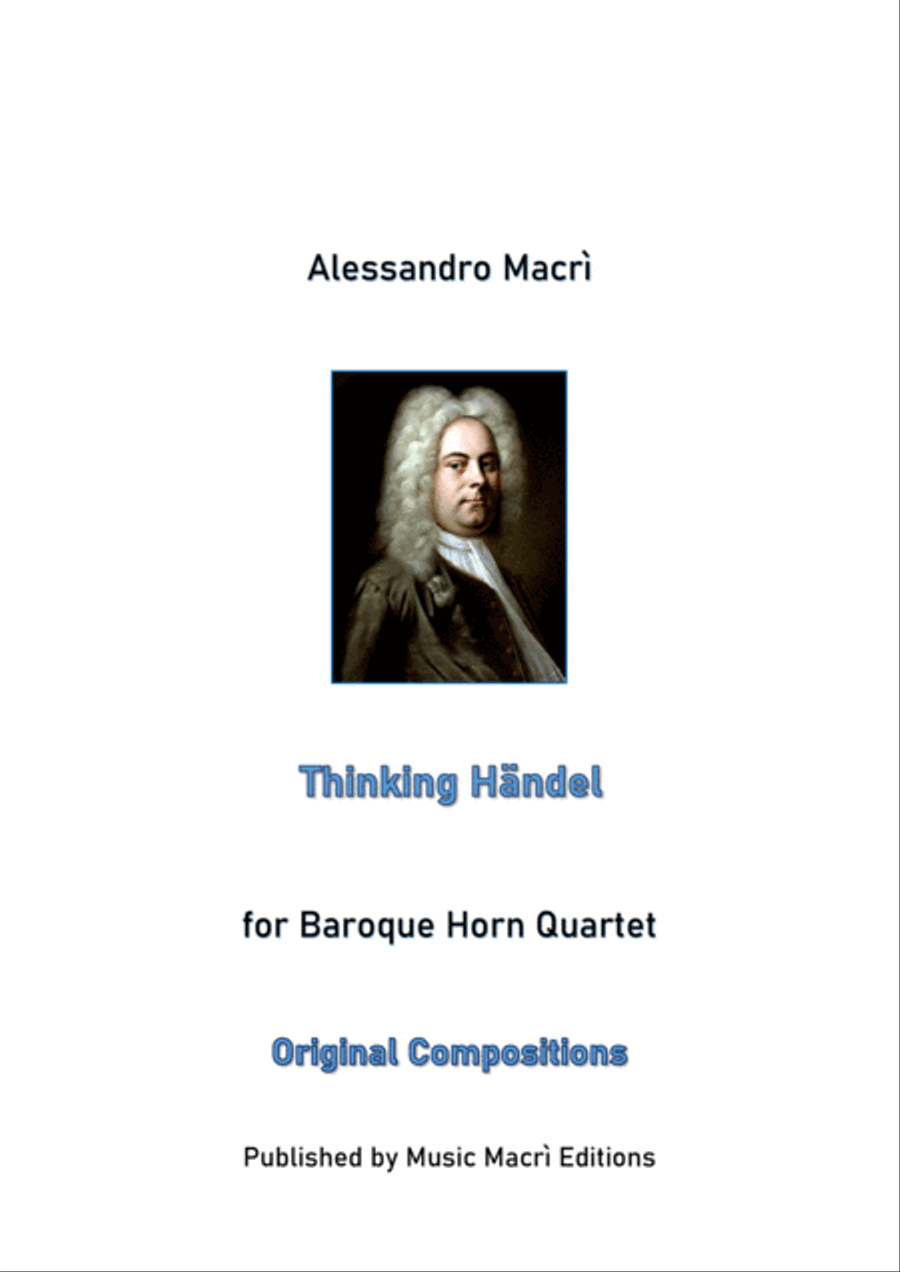Brass Ensemble Horn - Level 2 - Digital Download SKU: A0.931276 Composed by Alessandro Macrì. Baroque,Classical,Concert,Instructional,Standards. Score and parts. 10 pages. Music Macri Editions #6082045. Published by Music Macri Editions (A0.931276). Thinking Händel è un tributo al grande compositore Georg Friedrich Händel, coetaneo di Johann Sebastian Bach, che fu tra i più illustri rappresentanti del barocco musicale. Scrisse opere, oratori e musica strumentale, assimilando gli stili del Settecento che fuse in una sintesi personale e unitaria.I primi successiHändel nacque nel 1685 a Halle, in Germania, da una famiglia senza tradizioni musicali. Iniziò da bambino lo studio della musica, dimostrando subito un grande talento come compositore e organista. All'università di Halle intraprese anche studi giuridici. Nel 1703 si stabilì ad Amburgo, dove lavorò come violinista e dove ebbero luogo le prime esecuzioni di sue musiche, tra cui l'opera Almira, regina di Castiglia (1705).Negli anni successivi compì diversi viaggi in Italia, in Germania e a Londra, dove nel 1711 fu rappresentata con grande successo la sua opera Rinaldo. Nonostante sia oggi conosciuto soprattutto per gli oratori e la musica strumentale, ai suoi tempi Händel fu molto apprezzato per le opere teatrali, prevalentemente composte secondo il modello dell'opera seria italiana (forme musicali). Ambientata in epoca classica, di argomento letterario o di ambientazione mitologica, l'opera seria alterna, in lingua italiana, recitativi e arie. I recitativi, con un'intonazione vicina alla lingua parlata, servivano a far procedere l'azione ed erano accompagnati dal cembalo e a volte dall'orchestra. Le arie, con intonazione melodica, avevano la funzione di esprimere gli stati d'animo o 'affetti' dei personaggi e in esse i cantanti mostravano la propria virtuosistica bravura.Al tempo del soggiorno londinese risalgono anche due significative composizioni orchestrali: le tre suite Musica sull'acqua (1715-36), nate per accompagnare le feste sul Tamigi di re Giorgio I, e i Sei concerti grossi op. 3 (1730-34), ispirati al modello del musicista italiano Arcangelo Corelli.La cittadinanza ingleseNel 1719 Händel promosse la fondazione di una società musicale privata, la Royal academy of music, e ne diventò direttore. Nel 1727 ottenne la cittadinanza inglese e per molti anni dominò la scena musicale britannica. Oltre alle circa quaranta opere teatrali, tra cui Giulio Cesare in Egitto (1723), Rodelinda regina de' Longobardi (1725), Ariodante (1734), Alcina (1735), Serse (1737-38), in questi anni scrisse più di venti oratori â composizioni di argomento religioso, per soli, coro e orchestra â in forma drammatica e in lingua inglese (con narrazione, personaggi e dialogo ma senza scena teatrale), per lo più con testi tratti dall'Antico Testamento (tra cui Esther, 1718, Saul e Israele in Egitto, del 1738 entrambi).L'adesione di Händel alla cultura inglese non fu occasionale, ma profondamente sentita: lo dimostrano alcuni lavori vocali e strumentali, come Acis e Galatea (1718, con una seconda versione nel 1732) e l'Ode per il giorno di s. Cecilia (1739), composti su testi di poeti inglesi di grande rilievo come John Dryden e Alexander Pope.Tra la musica strumentale, Händel dedicò in particolare all'organo, di cui era valente esecutore, ben venti concerti con orchestra.Il Messia e le ultime composizioniL'oratorio Messia è uno dei lavori più conosciuti di Händel: eseguito a Dublino nel 1742, fu scritto per una istituzione benefica in soli ventiquattro giorni. Il libretto di Charles Jennens, in inglese, illustra in tre parti i momenti più rilevanti della vita di Cristo con brani delle Sacre Scritture (è l'unico oratorio tratto dal Nuovo Testamento). La prima parte tratta dell'Avvento e del Natale; la seconda della Passione e della Resurrezione, culminante nel celebre Halleluja; la.
